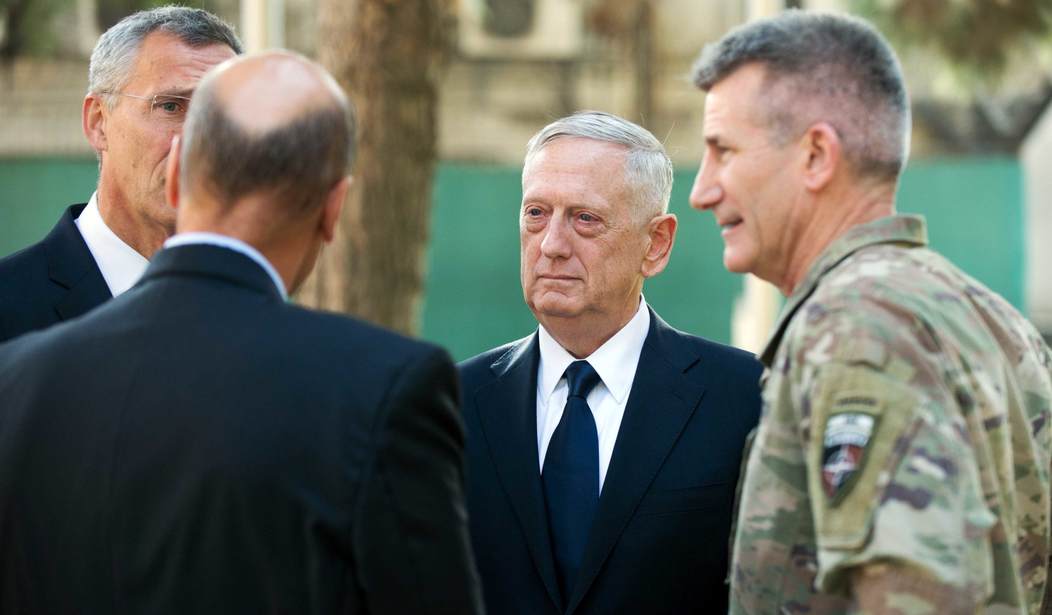WASHINGTON — Defense Secretary James Mattis cautioned against a U.S. military that’s “dominant and at the same time irrelevant,” telling the Association of the U.S. Army conference today that warfighters must adapt to “new domains of conflict, in space and cyberspace, and in ways that involve deniable attacks even on our democratic processes.”
“This is our problem statement: how to maintain a safe and secure nuclear deterrent and maintain a decisive conventional force that can also fight irregular warfare,” Mattis said.
“First, everything we must do must contribute to the increased lethality of our military. We must never lose sight of the fact that we have no God-given right to victory on the battlefield,” he said, noting that “every personnel policy, our training time, our organization and more” are being examined “to ensure they contribute to make us the most lethal joint force in the world.”
He took a dig at budget sequestration: “Even as our competitive edge over our foes and adversaries decreases due to budgetary confusion in this town and the budget caps, I am among the majority in this country that believes our nation can afford survival. And I want the Congress back in the driver’s seat of budget decisions, not in the spectator’s seat of automatic cuts.”
“I have great confidence in the U.S. Congress, but I have no confidence in automatic, mathematical budget cuts,” the secretary added.
Mattis said the second front is “following the example of the Greatest Generation” by building and maintaining alliances. “I will just tell you, from NATO in Europe to the Pacific, the message to our allies is, we are with you,” he said to applause.
The third “aggressive” effort, he continued, is to “rework our business practices to gain full benefit from every dollar spent on defense.”
“Historian T.R. Fehrenbach once wrote, ‘You may fly over a nation forever, you may bomb it, atomize it, pulverize it and wipe it clean of life. But if you desire to defend it, if you desire to protect it, if you desire to keep it for civilization, you must do this on the ground the way the Roman legions did: by putting your young men in the mud.’ I would only modify it today by saying, ‘by putting your young men and women in the mud,'” Mattis said.
“…Whether you spend a few years in your youth in the U.S. Army, ladies and gentlemen, or grow gray in the service to our beloved nation and its Constitution, rest assured, you will always look back on the sacrifices of war, the demands of sergeants, and the frustrations of unpredictable deployments as the best years of your young lives.”
Mattis gave a “salute” to an Army effort to toughen physical standards, and called on soldiers to mentally “enhance your warfighting skills, assuming every week in the Army is a way to get better at integrating all Army and joint efforts to become more tactically cunning.”
Asked during the Q&A what the U.S. can do to lessen the chance of war on the Korean peninsula, Mattis called the current administration strategy “a diplomatically-led economic sanction-buttressed effort to try to turn North Korea off this path.”
“Now, what does the future hold? Neither you nor I can say. So there’s one thing the U.S. Army can do, and that is, you have got to be ready to ensure that we have military options that our president can employ, if needed,” he added. “We currently — we currently are in a diplomatically-led effort, and how many times did you see in the UN Security Council vote unanimously, now twice in a row, to impose stronger sanctions on North Korea? And remember, the Security Council has countries like France and Russia, China, the United States — you know who’s on there — and all voted unanimously on this.”
“The international community has spoken, but that means the U.S. Army must stand ready. And so, if you’re ready, that’s your duty at this point in time. And I know the Army will always do its duty.”









Join the conversation as a VIP Member